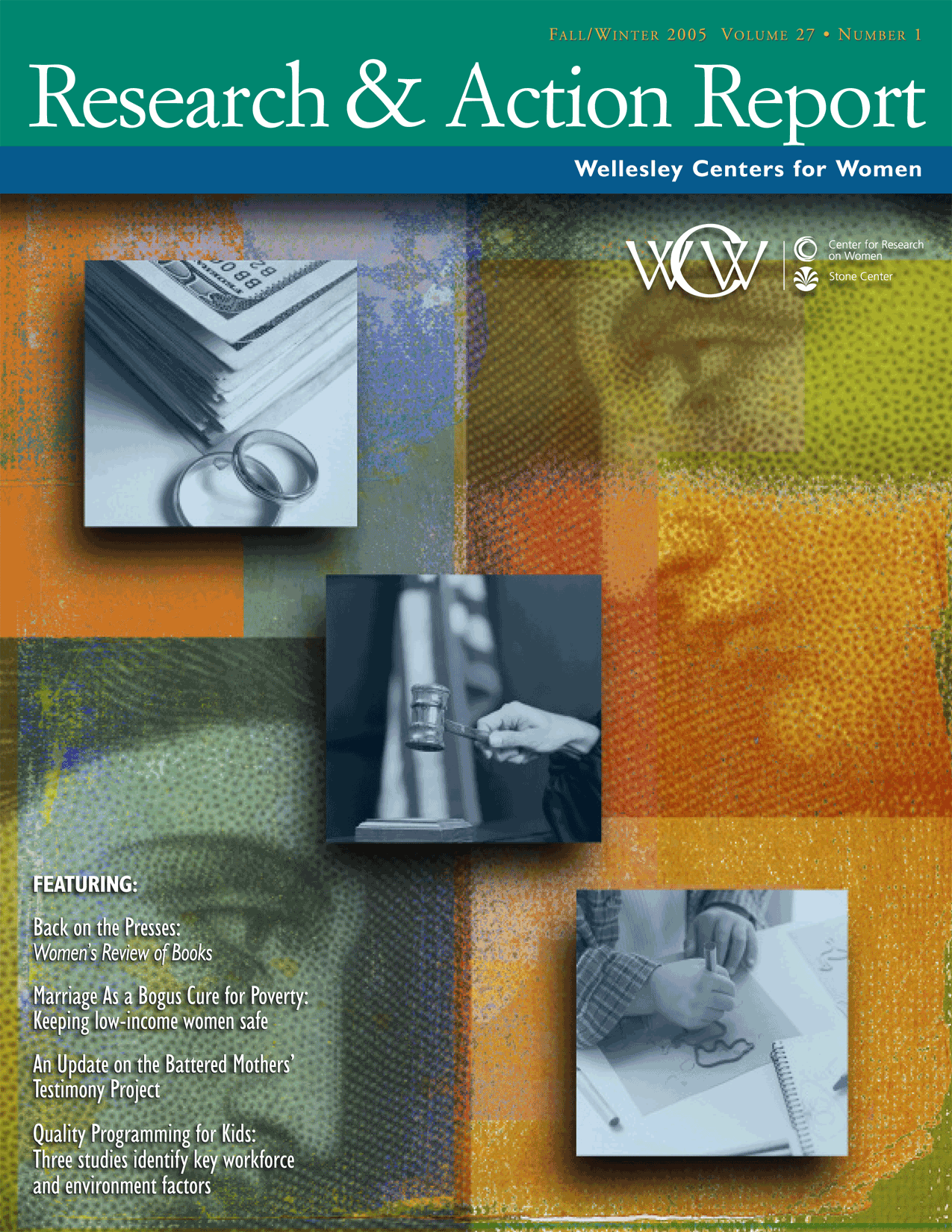Research & Action Report Fall/Winter 2005
This past June, the Jean Baker Miller Training Institute (JBMTI) at the Wellesley Centers for Women (WCW) held Research Forum 2005, a professional development program that showcased “Relational-Cultural Research in the Real World” and provided resources for investigators who seek practical examples to inform and advance their work.
“The Research Forum is very helpful for practitioners and researchers,” says Linda Hartling, associate director of the JBMTI. “Professionals aren’t just presenting their findings, they’re discussing the latest methodologies for conducting relationalcultural research in the real world and are leaving us ready to put these into action.” As part of the JBMTI annual Summer Institute, the Forum featured an important keynote address, “Coping with Complexity in Relational Research: Some statistical strategies,” by Allison Tracy, methodologist at WCW. Acknowledging that there are several complexities inherent in research on Relational-Cultural Theory (RCT), Tracy provided strategies for analysis that not only allows the researcher to cope with these complexities, but also enables better examination of important elements of the RCT model. Focusing primarily on quantitative research, she emphasized that RCT is ripe for rigorous empirical testing—both to legitimize the model and intervention efforts, as well as to identify areas requiring further theoretical development.
“I felt that the Forum marked an important moment in the ongoing development of RCT in that we were taking a critical look at how well the theory works or doesn’t work in the ‘real world,’” reports Anne Noonan, research scientist at WCW, who presented on a study that examines social class and relational health. “The research presented highlighted the theory’s viability with populations we have given less attention to, such as urban high school students.” Noonan’s presentation was one of three that demonstrated how RCT is integrated into research examining critical issues that impact the lives of adolescents and young adults. These studies included:
- “Where I Come From: Urban high school students talk about social class and relationships at work,” by Noonan, which shared findings of a qualitative analysis currently being conducted in an ongoing study with 30 Boston Public High School students participating in school-to-career programs.
- “The Effect of Relational-Cultural Inspired Strategies of Intervention on White Eighth grade Adolescent Racism,” by Laura Catullo from Nova Southeastern University, in Florida, which explored the effectiveness of relationalcultural
inspired methods of intervention in reducing racism and increasing white eighth grade adolescent race identity awareness and attitudes toward other racial groups. - “Racial Differences in the Relational Health and Depressive Symptoms of College Women,” by Natalie Arce from the University of Florida Counseling Center, which examined the relationships among peer, mentor, and community relational health and depressive symptoms in a racially diverse sample of college women; this program also determined whether racial differences exist among the levels of depression and relational health in college women.
Noonan’s and Catullo’s projects received funding from the Robert S. and Grace W. Stone Primary Prevention Initiatives Grant Program.
Sponsored by the JBMTI Research Network, the Forum also featured the presentation of the Irene Stiver Dissertation Award to Maureen Streff, associate professor at Regis College in Massachusetts. This year, the Network sought to highlight research applications of RCT in community and/or clinical settings and Streff’s dissertation was singled out. She shared her findings in, “Perceptions of the Present and Future: An assessment of relational experiences, social support, and personal resources by women 65 and older.” Her work included both qualitative and quantitative data, including information collected through the Mutual Psychological Development Questionnaire, which was developed at the Stone Center at WCW by Nancy Genero, Jean Baker Miller, and Janet Surrey, and which had never been used with older women prior to this initiative. The Poster Session, coordinated by Streff, featured a wide range of examples of recent RCT research and action projects. These included:
- “Meeting the Health Needs of Immigrant and Refugee Women in Canada: A Relational-cultural perspective,” by Catherine Chan from St. Joseph’s Health Centre, Ontario;
- “Living Outside the Box: Relational challenges of lesbians in love with men,” by Ellen Schechter from the Stone Center Counseling Center at WCW;
- “Respect-At-Work,” by Barb MacQuarrie, Jude Fairweather, and Mandy Bonisteel from the Center for Research on Violence Against Women and Children, Ontario;
- “Perception of Mutuality Between College Women and Their Parents,” by Jennifer Sanftner from Slippery Rock University, PA, and Mary Tantillo from Unity Health System, NY;
- “Women Speak about the Experience of Brief Relational-Cultural Therapy: Preliminary qualitative results of a comprehensive two-year outcome study,” by Anne Oakley, Shirley Addison, and Joyce Curry from Women’s College Ambulatory Care Center, Ontario, and Christine Dunbar from the Brief Psychotherapy Centre for Women, Ontario; and
- “Relational Development Needs of Adolescent Boys,” by Ricky Pelach-Galil from the Hebrew University of Jerusalem, Israel.
The coordinating committee for the JBMTI Research Network included: Nancy Genero,
Linda Hartling, Karen Kayser, Renée Spencer, Ruth Paris, Maureen Streff, and Mary Tantillo, with advice and assistance coming from the JBMTI faculty. Next year’s Summer Institute is slated for June 21-25, 2006, and will feature Research Forum 2006.
"I anticipate that we’ll be hearing more and more from practitioners on how they have been able to conduct research based on Relational-Cultural Theory and how the model has positively impacted their work,” says Judith Jordan, co-director of the JBMTI. “It’s very important that we demonstrate how effective this model is in many environments so that it can be used to its greatest potential.”


